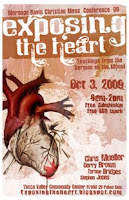"What's this?" the visitor asked.
"It's our library," the cab driver announced proudly.
"No, you don't understand. I want to see your country's major attractions."
"Ah, but this is one of our best attractions!"
I heard this story last week, and as far as I know, it's true. Icelanders really take their books seriously. And they remind all of us that libraries are special.
We don't often appreciate them today, but I for one still love public and school libraries. I love my childhood memories of being in the library. I love exploring new libraries in towns that I visit. And I simply don't think the internet can ever completely replace the library. In fact, I believe the internet makes brick-and-mortar libraries more valuable to us.
Now, I must admit I haven't spent much time studying in a library since seminary. Public libraries are often noisy places full of activity - more like a train station than a convent. But in one sense I'm glad they're busy. That means people are using them. Just as a book in perfect condition is of no use, so a quiet and empty library is pointless. Libraries are meant to be public gathering places, where stuff happens and ideas are exchanged.
Here are ten reasons I love the library:
- Free books. Of course, the highlight of any library is all the free books available to check-out and renew. Biographies. Novels. Technical manuals. History books. Audio books. For 3-6 weeks, that book is all yours. It's like meeting a new friend. Enjoy it. Learn from it. Journal or tell others something about it. The author may open new worlds of imagination or share an idea that will literally change your life.
- Interlibrary loan. In San Bernardino, it's free to request books from other libraries in our same network. So, we have millions of additional titles available at no charge. Just ask the clerk, or place a hold from your home computer, and the library will call you as soon as the book arrives at your local branch. If there's no waiting list, the book usually comes in a week or so.
- Book sales. I love browsing the discard shelves and attending Friends of the Library sales. You never know what gems you will discover. We've accumulated many books and sets for our personal family library this way.
- Periodicals. Nowhere else can you browse hundreds of magazines and check many of them out for free. I've used their Consumer Reports several times before making a big applicance purchase.
- Internet. For those who do not have home internet access, you can have free access for a limited time at the local library. This is great for those who need to check their email, look for job openings, or do online research. (Of course, many people use them to play games, too).
- Study areas. You'll probably spend $4 on coffee to study at a Starbucks, but the library is completely free. Cozy chairs are often available for reading and working on your laptop, and tables abound for more in-depth research. Public libraries may be noisy, but these sounds are easily blocked out with a good pair of earplugs or a set of earbuds and some relaxing music
- Special activities. Story time, free literacy programs, crafts, reading clubs, and other activities are often hosted at libraries. Last year, my wife and son got to meet Rachel from the Signing Time sign language video series at our local library.
- Bulletin boards. The library is a helpful place to announce or learn about community events. Many have bulletin boards or a 3-ring activity binder.
- Puppets. Our library has a special kids section, complete with bright colorful cushions and animal puppets. This makes it easier for parents and older siblings to browse, while making the library a fun place for even the youngest members of the family.
- The park. Adjacent to our library is the city park. Rarely do we visit the library without a detour by the slides, monkey bars, and swingset. A great way to combine mental and physical exercise!





